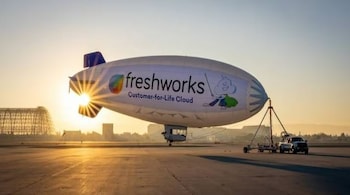Girish Mathrubootham, the founder and CEO of Freshworks, a Software-as-a-Service (SaaS) company listed on the Nasdaq, made news lately when the board of directors decided to revoke the CEO Performance Award, which entailed six million stock units. The decision, which was made in response to challenging macroeconomic conditions, highlights the difficulties businesses encounter when trying to match CEO compensation to shifting market dynamics.

Credit: Money Control
Background
Freshworks achieved a significant milestone when it made its Initial Public Offering (IPO) public in 2021. Girish Mathrubootham received a multi-year performance-based restricted stock unit award (CEO PRSU) from the board during this IPO. The award consists of 6 million shares, with vesting subject to both time- and performance-based requirements. The sharp contrast between the stock price barriers established in 2021 and the state of the market, however, has led to the recent decision to revoke this award.
The CEO Performance Award and Its Cancellation
In order for Mathrubootham to win the full $131.0 million CEO Performance Award, the stock price had to average at least $200 for two months prior to January 2029. But the price of Freshworks’ stock has dropped significantly; it was $36 per unit before the IPO and is now only $20 per unit. On February 16, the cancelation was formally announced in SEC filings, with the business citing external macroeconomic factors as the reason.
Board’s Rationale and New Equity Incentive Award
The board stressed that, considering the current state of the economy, the stock price requirements for the revoked award were overly aggressive. Girish Mathrubootham was given a new annual long-term equity incentive award by the board, which has a fair value of $19 million, in response. This choice is a reflection of the company’s recognition of the difficulties brought about by outside forces and its dedication to matching executive pay to reasonable performance goals.
Impact on Girish Mathrubootham and Freshworks Leadership
Even though Mathrubootham might not get the initially allocated stock units, the new equity incentive award makes sure that his contributions to the company’s success are appropriately acknowledged and valued. The action highlights Freshworks’ leadership’s flexibility in responding to changes in the market. In spite of unforeseen difficulties, the company’s resolve to give value to its stockholders is reflected in the decision to cancel the award and offer a fresh incentive.
Equity Incentive Awards for Other Executives
The board’s actions extend beyond the CEO, as annual equity incentive awards have been approved for other key executives. President Dennis Woodside is set to receive an award with a fair value of $15 million, while CFO Tyler Sloat and Chief Product Officer Srinivasagopalan Ramamurthy will be granted awards with fair values of $6 million each. These awards comprise both time-based and performance-based restricted stock units (RSUs), highlighting the board’s strategy to motivate and retain top talent across various leadership roles.
Financial Performance and Market Response
The financial success of Freshworks is impressive; for the entire year 2023, consolidated revenue from operations reached $596.4 million, a 20 percent rise from the previous year. With combined revenue of $498 million in 2022, the business had a strong 34% yearly growth. Freshworks is well-positioned in the competitive SaaS landscape thanks to its financial resiliency, even in light of the issues that led to the cancelation of the CEO Performance Award.
Possible Impacts on Freshworks and the Industry
Removing the CEO Performance Award and offering a new equity incentive shows that Freshworks is handling market uncertainty with pragmatism. This action may serve as a model for other businesses with comparable problems, highlighting how crucial it is to match executive pay to reasonable performance standards. It also emphasizes how important it is for incentive schemes to be flexible in order to adjust to changing market conditions and help businesses retain and develop their most valuable leadership personnel.
Conclusion
Freshworks’ recent decision to cancel the CEO Performance Award amidst tough macroeconomic conditions showcases the company’s responsiveness to market challenges. The move, coupled with the grant of a new equity incentive, highlights the commitment of the board and leadership to aligning executive compensation with achievable performance targets. As Freshworks continues to navigate the dynamic SaaS landscape, the industry may witness a shift in how companies approach executive compensation in the face of unpredictable economic conditions.












